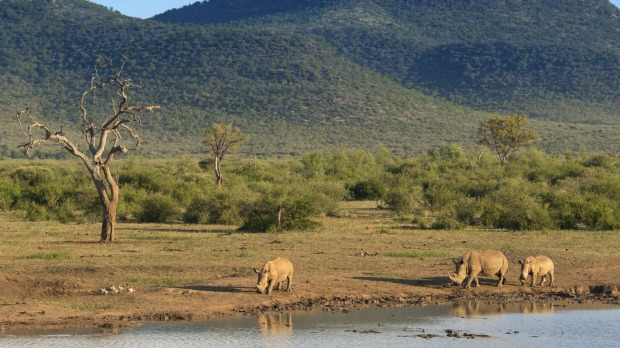
A white rhino stands watching over her baby gambolling in a muddy waterhole in a remote corner of South Africa's lush Kruger National Park. He grunts happily as he slathers himself in the sludge while his mother dips down to snack on the long grass between them.
Suddenly, she lifts her head, her ears twist round in our direction and she sniffs at the breeze coming towards her. She can't see us – rhinos have notoriously bad eyesight – but she's certainly caught our scent. She moves towards her calf warily, as if ready to protect him at all costs from these strangers.
"Yes, you're right to look after him," says our guide, South African-born Australian Ray Dearlove, gently. "But no need to worry about us. We don't mean you any harm. We're here to look out for you too."
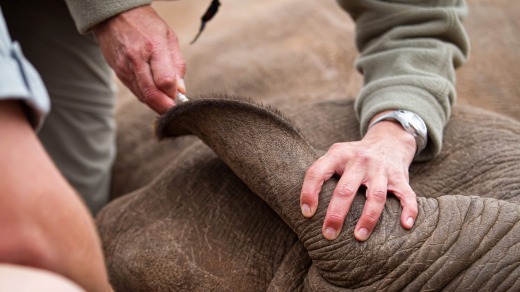
As animal lovers around the world reel from the shooting of Zimbabwe's favourite lion Cecil, it's reassuring to know there's an increasing number of holidays in southern Africa where the idea is to save wildlife rather than to destroy it. And chief among them is a novel new Australian trip aimed at helping save white and black rhinos, now the most threatened of the Big Five African game creatures.
It's the brainchild of this man by our side, Dearlove, a celebrated champion of the million-year-old species and the pioneer of The Australian Rhino Project, a daring scheme to airlift 100 rhinos over five years to Australia from their native South Africa.
Here, in Kruger, their numbers are being decimated by poachers, intent on slaughtering them and hacking off their horns which are sold on the black market for more, gram for gram, than gold. The plan is that a healthy herd of rhinos – technically, a crash of rhinos – safe in open plain zoos across Australia, would be the perfect insurance against completely losing the animals in the wild.
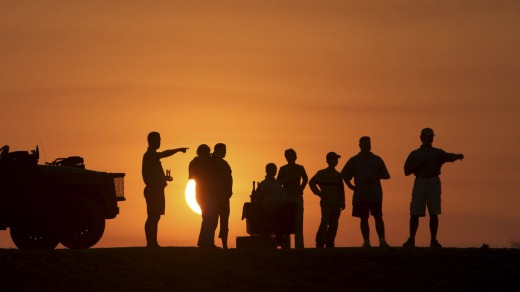
As part of Dearlove's fundraising drive for the initiative, he's organised, in collaboration with The Classic Safari Company, a 10-day expedition to South Africa next year. Called The Endangered Rhino Safari, its aim is to give participants an insight into rhinos and the efforts being made to save them from the danger of extinction.
As well as staying in two different camps, with quite diverse eco-systems, there'll also be plenty of rhino-spotting, as well as other game, like lion, cheetah, leopard, elephant, various antelope, endangered painted hunting dogs, hyena, warthogs, baboon and birds. But what makes this trip so different is that it will also involve talks from park ecologists about radio-collaring a rhino, and from those at the frontline of battling the rhino poachers about their tactics, technology and techniques.
Then there's the absolute crowning moment: the chance to join a team of rangers, vets and ecologists and be a hands-on participant in a rhino-notching operation.
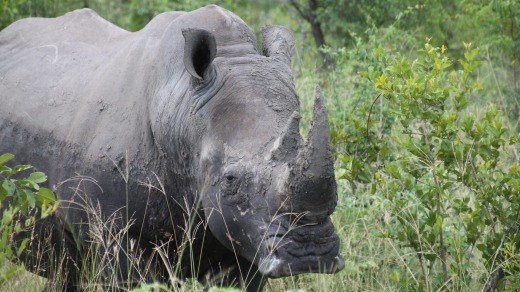
And what's that? In short, it's helping notch a rhino's ears to mark it, as well as take DNA and blood samples, and put a tiny transmitter under its skin and into its horn. These are all a means of adding it to the database of rhinos in southern Africa, in the hope of being able to track the individual animal and thereby better able to protect it. It's also one of the most thrilling, heartrending and touching experiences anyone can ever have.
"That's going to make it the trip of a lifetime for people," says Dearlove, or 'Rhino Ray' as he's nicknamed. "It's absolutely unique.
"We just don't know how long rhinos will last in the wild but it's so rare that anyone gets the opportunity to do something like this, to see, firsthand, what's being done to protect rhinos, and then actively help to save them."
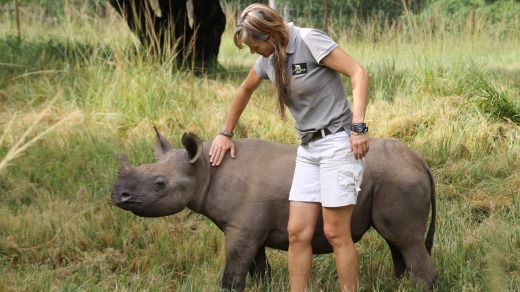
Standing in the bush in Kruger – a park the size of Israel – being briefed by experts in species conservation is a fascinating entree. The day we did it was a thrill a minute, including on the way there. I'll never forget the moment a passenger in the vehicle we were in got out (inadvisedly) for a moment to check the route ahead in the pitch black of early morning … and then came hurtling back inside after spotting a lion a couple of metres away eyeing him hungrily as breakfast.
But arriving at the pre-determined spot and standing with the vets and rangers talking about rhinos and their habitat, as the landscape hums and buzzes and twitches with animals, is an incredibly atmospheric education. And even though those in charge of the operation tell you what to expect, you're still not at all ready for the tide of emotion it seems to bring up in everyone present.
A small helicopter is first sent up to find a rhino that hasn't had its ears notched before. It seems an almost impossible task to even spot a rhino in that vast veld, teeming with every kind of wildlife, let alone check the state of its ears from the air, but, somehow, they find a young pregnant female, her ears intact. Next, a vet marksman goes up to fire a tranquilliser dart into her rump.
Everyone then piles into vehicles to drive to the spot, to help the dazed rhino fall to the ground, to ensure she doesn't injure herself – after all, rhinos can weigh a tonne or more. We also throw a blanket over her eyes to act as a blindfold, stuff her ears with socks so she won't be disturbed by the sound of us and then, when everyone's satisfied the rhino is sleeping soundly, the operation swings into action.
The vets are quick and efficient, taking their samples, drilling a tiny hole in the horn for the microchip and cutting the ears into a pattern that represents this rhino's number on the database.
All the while, there's something profoundly moving about seeing such an incredibly powerful prehistoric wild animal rendered suddenly so utterly helpless and vulnerable in front of us. A number of people in our group dab at their eyes, unable to stop the tears from flowing.
We all touch her thick, scaly skin in wonder, a few of us softly apologising for the necessity of having to subject her to something so undignified. I'm no exception. "Sorry, sweetheart," I hear myself whispering, as a few of us apply the antiseptic potassium permanganate to the cuts. "It'll be over soon."
And after about 20 minutes, it is. We withdraw a safe distance while Dearlove helps the vet in charge inject the antidote, and then scramble into the nearest vehicle as our rhino wakes up with surprising alacrity, lumbers to her feet and charges, in her confusion, towards us, before peeling off just before impact, as we all hold our breath, back into the bush. Sweet revenge.
How often have you heard people talk tritely about life-changing moments? Frequently? Occasionally? And how often has it been true? For me, helping ensure that single rhino will be safe from the foul business of the poachers was one of the most affecting experiences of my life.
Dearlove felt much the same way. While everyone's been sickened about the recent death of the much-loved lion Cecil, he believes the furore his slaughter has caused will serve only to bring even more attention to conservation tourism initiatives such as this. "Cecil's death wasn't about hunting," he says. "That was poaching, too.
"It was so callous and concentrated where he was deliberately lured out of a safe area to somewhere he could be killed. Rhinos can be even easier to poach because of their poor eyesight, and the sophistication of the international poaching syndicates. It's absolutely tragic to think that rhinos survived the ice age, but they might not survive us.
"But this is an amazing experience at the absolute frontline of the rhino conservation movement. It feels a privilege to be a part of it."
MORE INFORMATION
country.southafrica.net
GETTING THERE
Qantas flies direct to Johannesburg from Sydney daily except Wednesdays and South African Airways flies daily directly from Perth, with connections to Perth on Virgin
STAYING THERE
The tour includes one night in Johannesburg at the City Lodge Oliver Tambo Airport, four nights in the Madikwe Safari Lodge in Madikwe, and four nights in the Simbavati River Lodge in Timbavati, with all road travel included
SEE + DO
On safari, you'll be looking for rhino, lion, leopard, cheetah, buffalo, elephant, zebra, impala, giraffe, wildebeest and hyena. In the Timbavati private game reserve, Greater Kruger, there'll be the opportunity to take part in a rhino ear-notching operation, as part of the wider conservation efforts to save Africa's endangered rhinos. There'll also be talks, game walks and other conservation activities. The tour will be fully escorted by Ray Dearlove, founder of The Australian Rhino Project www.theaustralianrhinoproject.org.
DINING THERE
All meals are provided whilst on safari, including two dinners in a traditional boma with local gourmet cuisine, in Madikwe and Timbavati
TOURING THERE
The Endangered Rhino Safari leaves for South Africa on April 26-May 5 2016, for $8,500 per person twin/double share (excluding flights); minimum eight people and maximum 12. The tour is fully escorted by Ray Dearlove of The Australian Rhino Project see theaustralianrhinoproject.org The tour includes one night in Johannesburg, four nights in the Madikwe Safari Lodge in Madikwe, and four nights in the Simbavati River Lodge in Timbavati, as well as daily breakfasts and all meals while on safari, all game drives, walks, talks and conservation activities. www.classicsafaricompany.com.au
1. Help elephants in Thailand – you'll be helping care for elephants in a traditional Thai farming community, spending time with mahouts and learning how to work with, train and feed elephants now they've been rescued from the cities. From $940 a week with Voluntary Projects Overseas, www.voluntaryprojectsoverseas.org
2. Track jungle cats in Peru – you'll be working on a wildlife survey on cats, primates and other flagship species of the Amazon to help community conservation efforts and sustainable management projects. $2390 for a week with Biosphere Expeditions www.biosphere-expeditions.org
3. Monitor threatened owls in Victoria – join Parks Victoria Rangers to help assess population numbers and their territory to establish the preservation of suitable habitat for the future. $450 for three days with Conservation Volunteers www.conservationvolunteers.com.au
4. Volunteer with bears in Romania – help care for bears that have been mistreated, hunted, forced to dance for a living, kept in tiny cages and generally abused, and have now been rescued by the country's largest bear sanctuary. $1900 for seven days with Responsible Travel www.responsibletravel.com
5. Help save orangutans in Borneo – work at an award-winning rainforest wildlife refuge to provide enrichment and husbandry for the increasingly endangered orangutans, who've been injured, orphaned or been rescued as a result of deforestation and mining. From $2720 for 14 days with The Great Projects www.thegreatprojects.com